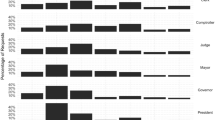Abstract
This article reports the results of a study that replicates and extends the impression-driven model of candidate evaluation reported in Lodge, McGraw, and Stroh (1989). This model holds that evaluations are formed and updated on-line as information is encountered, and that as a result, citizens need not rely on specific information available from memory to form their candidate evaluations. In the present work we explore whether the order in which information is encountered, as well as whether information that is personally important, influences the weight accorded to evidence in on-line processing. In addition, differences in information-processing strategies due to political sophistication are examined. The results indicate that important information receives more weight than unimportant information. In addition, the evidence suggests that political sophisticates are more efficient on-line processors than are less sophisticated individuals. The implications of these results for models of candidate evaluation are discussed.
Similar content being viewed by others
References
Anderson, Norman H. (1981).Foundation of Information Integration Theory. New York: Academic Press.
Anderson, Norman H., and Farkas, A. J. (1973). New light on order effects on attitude change.Journal of Personality and Social Psychology 28: 88–93.
Anderson, Norman H., and Hubert, Stephen (1963). Effects of concomitant verbal recall on order effects in personality impression formation.Journal of Personality and Social Psychology 2: 379–391.
Dreben, Elizabeth K., Fiske, Susan T., and Hastie, Reid (1979). The independence of evaluative and item information: Impression and recall order effects in behavior-based impression formation.Journal of Personality and Social Psychology 37: 1758–1768.
Fiske, Susan T., and Kinder, Donald R. (1981). Involvement, expertise, and schema use: Evidence from political cognition. In Nancy Cantor and John Kihlstrom (eds.),Personality, Cognition, and Social Interaction. Hillsdale, NJ: Erlbaum Associates.
Fiske, Susan T., Kinder, Donald R., and Larter, W. Michael (1983). The novice and the expert: Knowledge-based strategies in political cognition.Journal of Experimental Social Psychology 19: 391–400.
Hastie, Reid, and Park, Bernadette (1986). The relationship between memory and judgment depends on whether the task is memory-based or on-line.Psychological Review 93: 258–268.
Herstein, John A. (1981). Keeping the voter's limits in mind: A cognitive process analysis of decision.Journal of Personality and Social Psychology 40: 843–861.
Judd, Charles M., and Krosnick, Jon A. (1989). The structural bases of consistency among political attitudes: Effects of political expertise and attitude importance. In Anthony R. Pratkanis, Stephen J. Breckler, and Anthony G. Greenwald (eds.),Attitude Structure and Function. Hillsdale, NJ: Erlbaum Associates.
Kelley, Stanley, Jr., and Mirer, Thad W. (1974). The simple act of voting.American Political Science Review 61: 572–591.
Kinder, Donald R. (1986). Presidential character revisited. In Richard R. Lau and David O. Sears (eds.),Political Cognition: The 19th Annual Carnegie Symposium on Cognition. Hillsdale, NJ: Erlbaum Associates.
Krosnick, Jon A. (1988). The role of attitude importance in social evaluation: A study of policy preferences, presidential candidate evaluations, and voting behavior.Journal of Personality and Social Psychology 55: 196–210.
Lichtenstein, Meryl, and Srull, Thomas K. (1987). Processing objectives as a determinant of the relationship between recall and judgment.Journal of Experimental Social Psychology 23: 93–118.
Lodge, Milton, and Hamill, Ruth (1986). A partisan schema for political information processing.American Political Science Review 80: 505–519.
Lodge, Milton, McGraw, Kathleen M., and Stroh, Patrick (1989). An impression-driven model of candidate evaluation.American Political Science Review 83:399–420.
McGraw, Kathleen M., and Pinney, Neil (in press). The effects of general and domain-specific expertise on political memory and judgment processes.Social Cognition.
Simon, Herbert A. (1985). Human nature in politics: The dialogue of psychology with political science.American Political Science Review 79: 245–253.
Stewart, R. H. (1965). Effect of continuous responding on the order effect in personality impression.Journal of Personality and Social Psychology 1: 161–165.
Winer, Bernard J. (1971).Statistical Principles in Experimental Design. New York: McGraw-Hill.
Wyer, Robert S., Jr., and Srull, Thomas K. (1986). Human cognition in its social context.Psychological Review 93: 322–359.
Zaller, John (in press). Political awareness and elite opinion leadership.Social Cognition.
Author information
Authors and Affiliations
Rights and permissions
About this article
Cite this article
McGraw, K.M., Lodge, M. & Stroh, P. On-line processing in candidate evaluation: The effects of issue order, issue importance, and sophistication. Polit Behav 12, 41–58 (1990). https://doi.org/10.1007/BF00992331
Issue Date:
DOI: https://doi.org/10.1007/BF00992331




